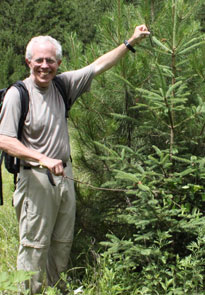 |
||||
| Forest Resources Home | News | Make a Gift | UW Alumni | ||||
|
September 2010 | Return to issue home
Welcome from the Interim Director
The active pursuit of global engagement and connectedness, one of the core values of the University of Washington, has been part of our school’s many legacies. Early UW forestry alumni went on to become leaders in forest management in the Philippines, Australia, New Zealand, Chile and Switzerland and worked for international agencies such as the U.N.’s Food and Agriculture Organization. In 1960, the Fifth International Forestry Congress, with nearly 2,000 participants representing 65 countries, met at the University of Washington. In Henry Schmitz’s history of forestry at the UW, The Long Road Traveled, he says the Congress, "… perhaps more than any other single event exemplifies the long road traveled by the College of Forestry from the initial offering of one course in general forestry by the University of Washington in 1894 to the international reputation for excellence in forestry research and education held by the College today …” The Congress, with its emphasis on the multiple use concept of forest management, also exemplified some enduring qualities of international forestry research and education—the continual transformative effects of new discoveries and the core necessity of integrating social, economic, and ecological perspectives into the quest for sustainable environmental and natural resources. Forest Resources faculty in the 1960s were involved in the formative years of the Organization of Tropical Studies; William Hatheway and Kenneth Turnbull were two of the original four executive directors and Forest Resources Dean Jim Bethel served as the organization’s third president. In 1969, Forest Resources partnered with Professor Richard Walker and the UW Department of Botany in hosting the International Botanical Congress. Our faculty and students were key participants from 1970-'78 in the International Coniferous Forest Biome Project, which by 1972 had extended to include more than 100 scientists from 15 universities, national laboratories and government agencies. Members of our community have carried out research all over the globe and our alumni from recent decades are working around the world in silviculture, forest engineering, natural resource policy, ecological restoration, conservation biology, plant exploration, paper science and wildlife management. Our students have participated in field studies in Africa, Latin America, Europe and Asia through international exchange programs and through the UW’s IGERTs on Bioresource-based Energy, Environmental Multinational Collaborations and Urban Ecology. SFR is a participant in the Peace Corps Master’s International Program, a professional degree program in which students complement a rigorous program of academic study with intense hands-on experience during their overseas Peace Corps assignment. And recently, our faculty participated in the U.N. Intergovernmental Panel on Climate Change, which shared the 2007 Nobel Peace Prize. A few examples, just from the past year, will give a flavor of the wide-reaching initiatives that make SFR a place where global connectedness is part of our everyday life:
I’m proud of our continuing global engagement and even more gratified that our undergraduate and graduate students are committed to making contributions to the conservation, management and sustainability of forest and other ecosystems around the world. Best,
Tom Hinckley * UW students, including SFR’s Julie Combs, Ziyu Ma, Alicia Robbins and Lauren Urgenson measured the meadow’s biodiversity in June 2007. Hinckley and others believe that these more than 3,000 year old, human-formed meadows will disappear if active management is not initiated. Ideally, he says, the historical disturbance regime might be reinstituted, but political and cultural barriers are steep. September 2010 | Return to issue home | ||||
|
||||

